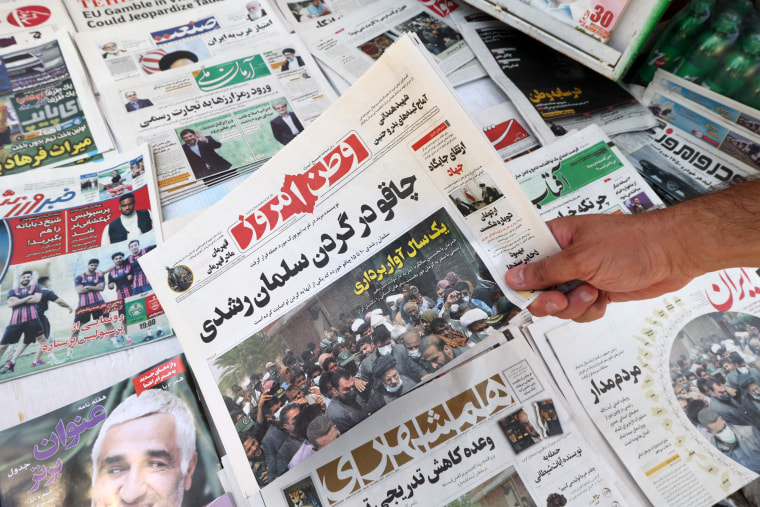TEHRAN, Iran — Iran said Monday that Salman Rushdie and his supporters are to blame for the stabbing attack that left the famed author hospitalized with serious injuries.
In its first public comments since the assault, Tehran denied any involvement but sought to justify the attack, which has been celebrated on front pages and in coverage across the country's media.
“We do not consider anyone other than him and his supporters worthy of blame or even condemnation,” Iranian Foreign Ministry spokesman Nasser Kanaani said.
“No one has the right to accuse Iran,” he added. “The insult that was done and the support that was given was an insult to all religions.”
Rushdie, 75, is now “on the road to recovery,” his agent said Sunday. He was removed from a ventilator a day earlier after having been hospitalized with injuries to his neck, eye, liver and chest. The author was stabbed about a dozen times during a speaking event at a resort in western New York on Friday.
Rushdie is best known for “The Satanic Verses,” which has been banned in Iran and is considered by some Muslims to be blasphemous. A decades-old fatwa demanding his killing still stands, though attention on the issue had eased in recent years.
Tehran said it had no knowledge of or relation to the attacker.
“We have not seen anything other than what we heard from the American media,” Kanaani continued. “We firmly and strictly deny any connection between the assailant and Iran.”
The suspect, identified as 24-year-old Hadi Matar from New Jersey, pleaded not guilty to charges of second-degree attempted murder Saturday. Initial police investigations found Matar expressed views sympathetic to the Islamic Revolutionary Guard Corps on social media prior to the attack. According to a senior U.S. official familiar with the investigation, Matar flew from New York to Lebanon in August 2018, returning to the U.S. via a flight from Moscow three weeks later.
The attack on Rushdie was met by global shock and outrage, and left the Western literary world reeling.
But Iranian media celebrated the incident.
The front pages of state-owned newspapers were splashed with caricatures of Rushdie under headlines gloating about the stabbing.
“The devil turns blind,” read the Iranian daily newspaper Jam e Jam's front page Sunday, above a depiction of the author as a devil without an eye. The hard-line Kayhan paper also hailed the attack as "a divine revenge" on its front page.

Secretary of State Antony Blinken condemned the coverage.
“Iranian state institutions have incited violence against Rushdie for generations, and state-affiliated media recently gloated about the attempt on his life,” he said in a statement late Sunday. “This is despicable.”
The author has lived with death threats for three decades.
“The Satanic Verses,” featuring a character based on the Prophet Muhammad, outraged much of the Muslim world when it was published in the late 1980s, inspiring protests and a firestorm that forced Rushdie into hiding for many years.
The novel also drew the wrath of the Iranian government, leading Iran’s Ayatollah Ruhollah Khomeini to issue a fatwa, or edict, calling for his death. A semiofficial Iranian foundation also put up a bounty of over $3 million for the author.
Amin Hossein Khodadadi reported from Tehran, and Rhoda Kwan reported from Taipei, Taiwan.